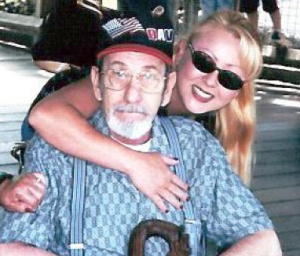“My Voice” by Katie Brown

Katie Brown and her father.
I was diagnosed with early stage cervical cancer at age 22. I think because the cancer was found so early and was removed, I didn’t think of myself as a survivor then. The doctors and nurses glossed it over, and aside from the follow up exams that I found annoying, I went about my life as usual. Nothing for me really changed.
When I was 29, my dad, who had never been sick a day in his life, got very ill. Even when the x-ray came back suspicious and a CT scan was ordered, we didn’t think much of it. If it was something serious, we’d just get “it” taken care of. Simple as that and just like me, he would be okay.
He was diagnosed with extensive stage small cell lung cancer. There was no warning, surgery wasn’t an option and chemotherapy and radiation would be palliative at best…BAM…just like that. He was given 4-6 months to live. Before that day, I never thought twice about lung cancer. It just wasn’t something that could happen to us.
What I didn’t know was that 80 percent of lung cancer is diagnosed in the late or extensive stage. There aren’t symptoms until the cancer has metastasized. There is no early detection test and the treatments at that time were the same five regimes from 30 years ago. I remember being devastated that the one year survival rate was less than 15 percent. There is also a huge stigma associated with lung cancer, as if those with it deserve it because they smoked. This isn’t true. First, no one deserves cancer and 60% of those diagnosed with lung cancer are long-time ex-smokers or NEVER SMOKERS. Today, non-smoking women under 40 are being diagnosed with lung cancer at an alarming rate. No one knows why. The causes could be from so many different things including genetics. If you breathe, you can get lung cancer.
So I began to fight. I was my father’s caregiver and advocate. I fought everyday beside him and became his biggest support. I made it a point to reinforce the fact that his type of cancer deserved support, recognition, awareness and better treatment options. There were no support groups or walks or runs or awareness efforts then. We felt like we were all alone.
Two months after my dad’s diagnosis I founded an organization called the Lung Cancer Support Community, an online support resource for anyone touched by a lung cancer diagnosis. Today we have over 6,000 members and received over four million independent visitors a month. My dad lived to see the start of LCSC. He passed away 11 months and 21 days after his diagnosis.
For almost seven years I’ve worked tirelessly supporting those with lung cancer, either online or at in-person support groups. I began to become more of an advocate beginning in 2006 thru the Lance Armstrong Foundation, Global Resource for Advancing Cancer Education and the Research Advocacy Network for all cancer types. I also run the first LC specific support group in Texas and the DFW Walk for LUNGevity.
I’m still the administrator and Director of the Lung Cancer Support Community, although now it is a service of the LUNGevity Foundation, the only organization dedicated to funding lung cancer research. We have support groups, walks, and events all across the country now.
I lost a part of myself when I lost my dad..and three years later my mom, but I realized…I AM a survivor and I continue to make his life and that of so many others who I’ve lost to cancer count for something..By fighting for a cure.


